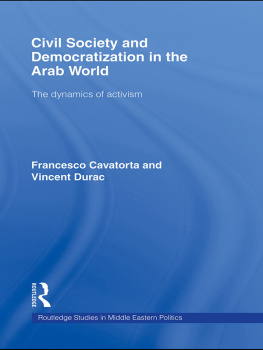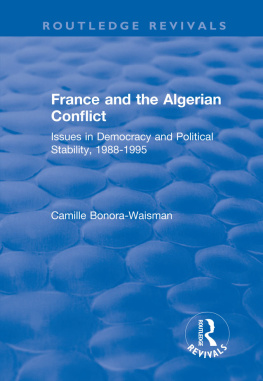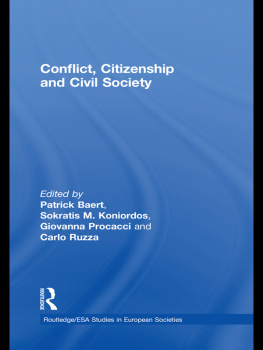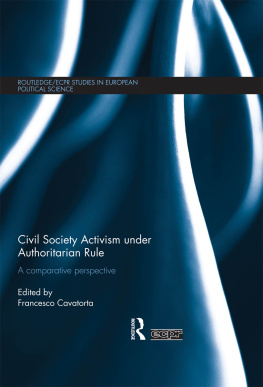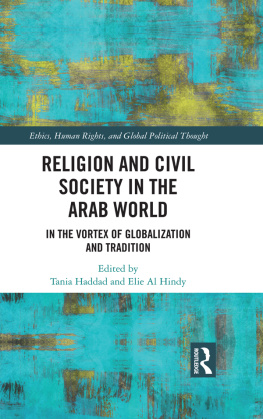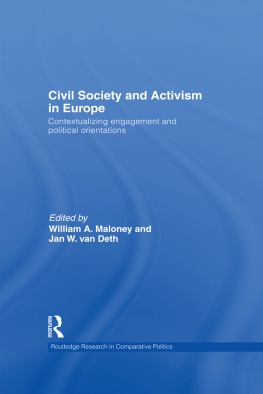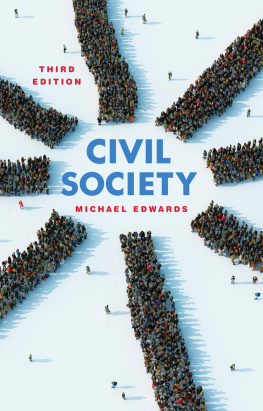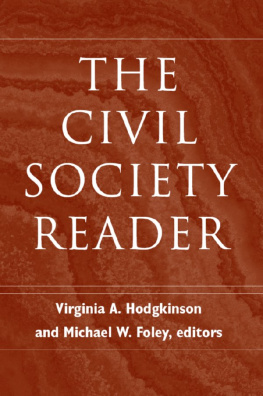
Jessica Ayesha Northey is Director of Postgraduate Research at the Centre for Trust, Peace and Social Relations, University of Coventry and Algerian country expert for the Bertelsmann Foundation in Stiftung, Germany. She has carried out numerous research assignments and electoral observation missions for international organisations, including the EU, the Westminster Foundation and the World Bank. She completed her PhD in Social & Political Sciences at the European University Institute, Florence.
A breath of fresh air has entered the polarised debates about associational life. After interviewing civil society actors in Algeria for more than ten years, Jessica Northey confidently takes us beyond facile generalisations about the value of associations. She shows in detail and with subtlety how citizens in this turbulent and authoritarian country have been staking claims to be legitimate political actors. She uses her trove of local insights to suggest sometimes surprising answers to weighty social scientific questions: can associations inculcate democratic behaviour? Do external donors like the EU help or hinder the development of this democratic process, as fragile as it is precious?
Diana Wylie, Professor of History, African Studies Center, Boston University
Based on months of in-depth fieldwork, this highly original book explores the internal dynamics of Algerian society, its attempts to take advantage of any vacuum inadvertently provided by the bureaucracy and its pragmatic use of European support, without adopting the conceptual framework of European institutions. It will be of great interest to those working on the evolution of civil society and national identity and on the future of political participation in Algeria and the region.
Professor Olivier Roy, Joint Chair of the Robert Schuman Centre for Advanced Studies at the European University Institute, Florence
This is an important and welcome publication for scholars seeking to understand the relationship between civil society and state not only in Algeria but across MENA. Jessica Northey offers engaging insights into a range of grass roots organisations in Algeria based on her extensive fieldwork and knowledge of the political, historical and social issues at play. Her focus is on the construction of civil society in Algeria over the past three decades, examining the effects of the post-1988 reforms, the role of European Union funding and the link between such forms of funding for associations and the EUs strategic aims and objectives in the Southern Mediterranean. But it is her astute use of empirical data gathered from an impressive range of interviews carried out during extensive field-work trips to Algeria that gives the reader such a real insight into the resilience and agency of ordinary Algerians those who have worked for social and cultural change through associations that allow communities to shape change. This book is marked by methodological rigour, enriched by Northeys linguistic and listening skills and informed by human empathy. Civil Society in Algeria brings us into the heart of everyday Algeria in a way that few books do and is essential reading for those of us who seek to understand civil society in North Africa.
Patrick Crowley, Head of Department of French and Senior Lecturer, School of Languages, Literatures and Cultures, University College Cork
This fascinating book identifies some of the key dynamics of socio-political change in contemporary Algeria. Drawing on personal experience and wide-ranging research in the country, including impressive fieldwork, Northeys analysis of the emergence and behaviour of numerous voluntary associations, active particularly in the fields of heritage preservation and social welfare, charts an extremely interesting and positive evolution in the relationship between state and society and argues persuasively that earlier pessimistic assessments of the role of associations in Algeria are now seriously out-of-date. A crucial feature of these dynamics is the way the associations she describes have eschewed contestation of the state and instead have developed strategies of constructive engagement and persuasion that tend to prompt new, equally constructive, responses on the part of Algerian officialdom. The associations demonstrated how their independent initiatives and activities, while advancing particular concerns and projects, have also been contributing to the commonweal, thus inducing the state to adopt a new and positive attitude towards them. Now, association activists and government agencies and office holders have begun to move along vital learning curves into new and hopeful territory. Northeys lucid and judicious analysis authorises us at last to speak of the emergence of civil society in Algeria without debasing that venerable concept. This is an original and important book and a most welcome contribution to the study of contemporary Algeria.
Hugh Roberts, Edward Keller Professor of North African and Middle Eastern History, Department of History, Tufts University and author of Berber Government (I.B.Tauris, 2017)

In memory of our friend and colleague Ahmed Bouchetata,
Allah yerhmou, and for all the associations
CONTENTS
This book is a result of support from the European University Institute in Florence, from the Centre for Trust, Peace and Social Relations in Coventry University and from hundreds of Algerian associations who participated in this project to understand more about civil society in Algeria. I extend heartfelt thanks to Olivier Roy, Lahouari Addi, Pascal Vennesson and Patrick Crowley who offered their expertise, as did Bahar Baser, Leila Hadj-Abdou, Tamirace Fakhoury and Benoit Challand. Exceptional colleagues in Algeria Assia Harbi, Tric Boucebci, Ahmed Bouchetata, Youcef Rahmi, Ahmed Djebara, Mohamed Hadj Hammouda, Ferial Assia Selhab, Belkacem Messaoudi, Faycel Hattab, Zoubida Kouti, Tarik Loumassine, Karima Slimani and Madjid Azzoug (and their families) invested much time supporting the fieldwork over the last decade. It was a privilege to have spoken with Abdelmadjid Harbi, Youcef Hadj Ali, Francis Ghils, Robert Parks, Omar Derras, Brahim Salhi, Anouar Benmalek, Yahia Belaskri and Maissa Bey, who all gave useful feedback and encouragement. Annette Boucebcis friendship, and her endless optimism and love for Algeria, made the fieldwork so much more inspiring. From the associations, many people gave their precious time, on top of their dedication to improving conditions, in social, cultural and environmental aspects of Algerian life. Ahmed Daoud, Houaria Djebarri, Djamila Hamitou, Mohamed Ider, Cherifa Kheddar, Kouider Metair, Khelil Moussaoui and Saleh Tirichine are a few of the inspirational people who are behind the case studies and interviews discussed throughout this book. Earlier versions of some of the material in appear in Algerian Heritage Associations: National Identity and Rediscovering the Past, in Patrick Crowley (ed.) Algeria: Nation, Culture and Tansnationalism, 19882016, reprinted by permission of Liverpool University Press. I am grateful to I.B.Tauris, to Sophie Rudland the editor, and to the excellent anonymous reviewers, for taking on this manuscript and these different perspectives on Algerian civil society. Finally, Matthew, my family and my mother Julie in particular, have all provided moral and editorial support to ensure these stories can be told with the minimum of eloquence they deserve.


